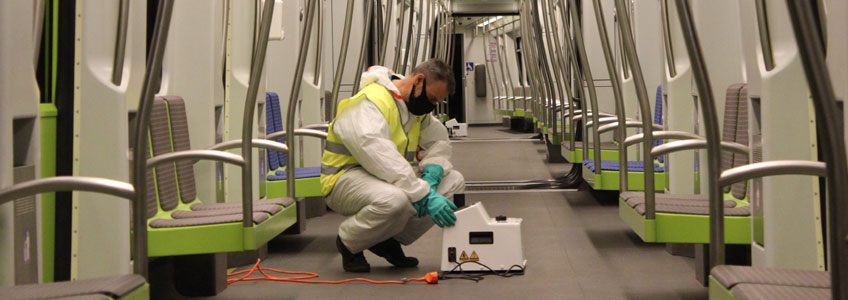- Additional cleaning and disinfection work, the capacity control system and the purchase of protective equipment were the areas to which the largest budgets were allocated.
- As part of these initiatives, in January COVID-19 Assistants were included in the service to provide support at stations and on trains.
The Generalitat allocated 10.5 million euros, from March 2020, to deal with the current health crisis caused by COVID-19 in the Metrovalencia and TRAM d’Alacant networks and to adopt different measures to ensure a safe transport service. In 2020, before the state of alarm was declared, Ferrocarrils de la Generalitat Valenciana (FGV), like other companies in the sector, adopted different measures to deal with the health emergency caused by coronavirus. The Minister of Territorial Policy, Public Works and Mobility, Arcadi España, and the managing director of FGV, Anaïs Menguzzato, have met today to take stock of the actions carried out during the pandemic and to make progress on measures that allow to continue ensuring a safe public transport service. After the meeting, the Minister insisted that public transport “has to be efficient and safe” and also recalled that all international reports attest that “the risk of infection in public transport is very low, especially taking into account the measures that have been implemented to protect passengers”.
In recent months, Ferrocarrils de la Generalitat Valenciana has carried out organisational and technical proceedings that have made it possible to deal with the current exceptional circumstances, in accordance with the guidelines established by the state and regional authorities. Faced with this new situation, it has been and is necessary to continue adopting measures in addition to those that have already been implemented in previous months to facilitate the use of public transport in conditions of maximum security. The financial resources allocated to these measures have meant an unforeseen allocation by FGV which, in turn, has been accompanied by a logical decrease in revenue, as a result of the lower number of passengers registered, especially during the months of confinement.
Main measures and proceedings
The largest financial allowance that FGV has had to make in recent months has been the additional cleaning and disinfection work that has had to be carried out on trains, trams, stations and in its own facilities such as workrooms and offices.
The budget allocated to this section is more than five million euros (exceptional cleaning and disinfection in facilities and trains, to which disinfection by means of spraying inside trains and trams has been added since last October).
This work has been accompanied by the collection of samples to detect the possible presence of remains or traces of COVID-19 in collaboration with the Spanish National Research Council (CSIC) of the Ministry of Science and Innovation.
From this month of January, the incorporation of staff for information and control of compliance with health and prevention standards in force, as a result of the pandemic caused by the COVID-19, has a budget of 1.5 million euros.
Among the tasks of these assistants are to ensure that the persons using the transport services comply with the health regulations in force. In addition, they collaborate in access and capacity control, assisting in the correct distribution of customers on platforms and units and ensuring the correct use of the facilities, as well as notifying of any incidents.
Furthermore, Metrovalencia’s capacity control system has required an investment of over one million euros. With this new system in service since last September, the main facilities have information screens distributed in the lobbies, which provide real-time information on the occupancy rate of the trains running as they pass through these stations.
Following on from this, the purchase of sanitary and protective products (masks, gloves, hydroalcoholic gel), as well as the installation of partitions in offices and work stations has meant an expenditure of 1.5 million euros.
Likewise, the communication and awareness-raising proceedings carried out over the last few months in stations and external facilities have amounted to more than half a million euros, with the aim of informing the public about the new measures and to restore confidence in the safety of public transport.
Other measures put in place since the pandemic began have made it possible to improve customer service, reinforce surveillance and security work, encourage teleworking and deal with the extra hours that have had to be worked.
Loss of income
At the same time, the health crisis has caused a logical decrease in demand during this period, so income has fallen considerably. The health crisis initially caused demand during the period of confinement to fall below 10% compared to the previous year.
During the de-escalation process it has been possible for passengers to rely on the transport services offered by Metrovalencia and TRAM d’Alacant again, but today the occupancy rate is still somewhat lower than 50% compared to last year.


